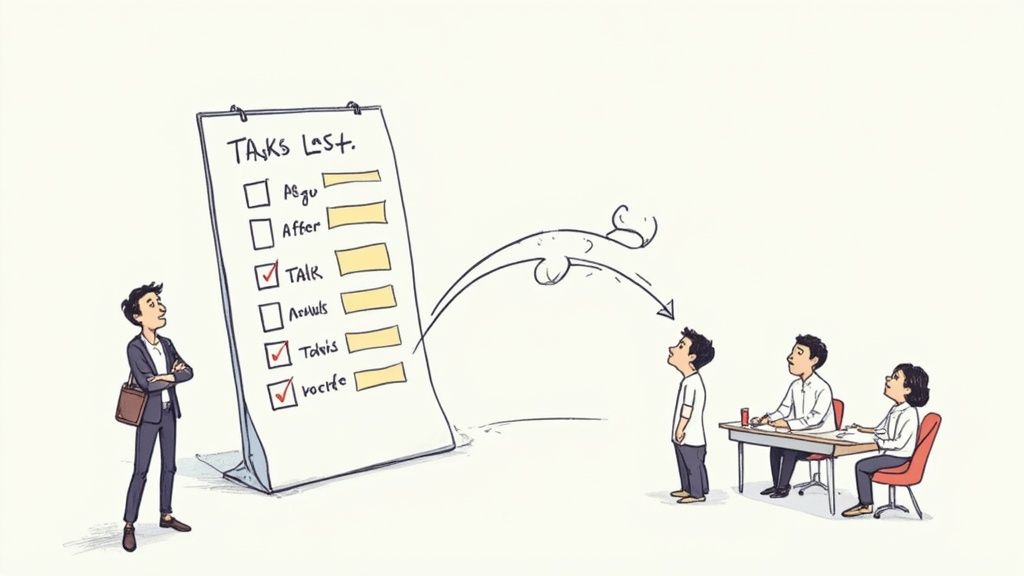How to Delegate Tasks Effectively: Enhance Leadership
The Power of Strategic Delegation

Smart delegation is more than just handing off tasks - it's a key way to help your organization grow and empower your team. When leaders delegate thoughtfully, they create space for new ideas while giving team members real ownership of their work. This boosts team spirit, gets more done, and helps the bottom line.
How Delegation Drives Business Success
Good delegation can completely change how a company grows. When leaders hand off day-to-day tasks, they can focus on big picture planning and steering the company toward its goals. This creates positive ripples throughout the organization - team members build new skills and make bigger contributions. For instance, when a CEO delegates well, they can spend time building partnerships and finding new markets instead of getting stuck in daily operations.
The numbers back this up. A study by Gallup looked at 143 CEOs from the Inc. 500 list. Those who were skilled at delegation saw their companies grow by an amazing 1,751% over three years. That's 112 percentage points better than CEOs who didn't delegate well. Learn more about the impact of delegation in this piece on The Superpower of Effective Delegation Skills.
Building Strong Teams Through Delegation
Good delegation is essential for creating high-performing teams. When leaders trust their people with challenging but doable tasks, it builds confidence all around. Team members take pride in their work, do better, and feel more satisfied. Plus, taking on new responsibilities helps them develop leadership skills for the future.
Common Delegation Mistakes to Avoid
While delegation has clear benefits, watch out for these common problems that can make it less effective. Micromanaging - where leaders delegate but then control every detail - kills creativity and motivation. Another mistake is not delegating enough because leaders think they can do everything better themselves. This leads to burnout and stops team growth. The key is finding the sweet spot between giving guidance and allowing independence. Success comes from clear communication, setting expectations, and providing the right tools and support.
Selecting Tasks That Drive Maximum Impact

The key to successful delegation lies in choosing the right tasks at the right time. When you thoughtfully select what to delegate, you create opportunities for both organizational success and team development. Good delegation decisions require evaluating each task's value, difficulty level, and growth potential for team members.
Identifying High-Impact Delegation Opportunities
A clear system helps you pick the best tasks to delegate. Start by grouping tasks into clear categories based on their priority levels - high, medium, and low. Look closely at each task's importance to key business goals, how complex it is, and whether it offers good learning opportunities. This method helps ensure you're delegating tasks that will make the biggest difference.
The Task Delegation Decision Matrix
Here's a practical matrix to help guide your delegation choices. The table below outlines how to weigh different factors when deciding what to delegate and to whom:
Repetitive, low-skill tasks
High
Low
Minimal
Tasks requiring specialized skills
Medium
Medium
Moderate
Strategic decision-making
Low
High
High
Use this framework as a starting point and adjust it based on your team's specific needs and circumstances.
Balancing Delegation for Organizational Efficiency and Team Growth
Smart delegation serves two key purposes: it frees up your schedule for strategic work while helping your team members build new skills. The best approach is to assign tasks that challenge team members without overwhelming them. This balance leads to better results for everyone - studies show that effective delegation can boost revenue by an average of 33%. Learn more about the business impact of delegation in The Important Role Delegation Plays in Business Success. When done right, delegation becomes a powerful tool for driving both individual growth and company success.
Matching Tasks With Team Talent
Good delegation means more than just passing work down - it's about carefully matching tasks to each team member's unique abilities and goals. When done well, this approach both gets things done efficiently today and helps people grow their capabilities over time.
Assessing Team Strengths and Development Needs
Knowing your team goes beyond tracking technical skills. You need a clear picture of what drives each person, where they excel, and what they want to learn. For instance, someone who's great with data might be eager to try managing projects. Giving them a data task that includes some coordination work creates a natural learning opportunity.
A thorough understanding of your team requires multiple perspectives:
Skill assessments: Test hands-on abilities through practical exercises
Personality assessments: Understand work preferences and communication styles
Performance reviews: Look at past work to spot strengths and growth areas
One-on-one discussions: Learn about career goals and interests
This rounded view helps you assign work that fits while opening doors for growth.
Aligning Tasks With Career Aspirations
When you match tasks to career goals, delegation becomes motivating rather than just task assignment. Team members work harder and stay more engaged when their assignments help build skills they care about. This alignment makes everyone happier and strengthens team bonds.
Creating a Win-Win Scenario Through Strategic Delegation
Smart delegation helps both the company and the individual succeed. The organization gets quality work done while team members gain valuable experience and new abilities. Try giving people "stretch assignments" - tasks that push them slightly beyond their current skills. While this may need extra guidance at first, it builds a more capable team over time.
Utilizing the Right Tools for Delegation
Obsibrain makes delegating easier by tracking tasks, responsibilities and progress in one place. The platform enables clear communication about expectations and timelines while maintaining accountability. It also helps document skills and development goals, making it simpler to match the right person to each task and support their career growth.
Crafting Crystal-Clear Delegation Instructions

The success of delegation depends on clear communication between you and your team members. When delegating tasks, your instructions should eliminate confusion while giving your team the confidence to take ownership. Let's explore the essential elements of delegation communication that help team members succeed.
Structuring the Delegation Conversation
Think about delegation like giving directions to someone. You wouldn't just point and say "go that way" - you'd provide specific landmarks, route options, and a clear destination. The same applies to task delegation. Give your team member a complete picture by explaining the task's goals, importance, and available resources.
Start by explaining the "what" - the specific objective you want to achieve. Follow with the "why" - how completing this task supports broader team or company goals. This context helps team members understand the task's value. Finally, discuss the "how" - provide basic guidelines while leaving room for their own approach and ideas.
Setting Clear Expectations and Metrics
After explaining the task, establish concrete expectations around deadlines, deliverables and quality standards. Being specific helps prevent misunderstandings and keeps everyone aligned on what success looks like.
Define clear success metrics from the start. What specific outcomes will show that the task was completed effectively? Create metrics that are SMART - specific, measurable, achievable, relevant and time-bound. This gives your team member clear targets to work toward.
Balancing Guidance and Autonomy
Finding the right balance between direction and independence is key. Too many instructions can make team members feel micromanaged and stifle their creativity. Too little guidance leaves them confused and prone to mistakes. Your role is like a coach - provide support and resources while letting them execute the task their way.
Delegation Communication Checklist
Use this checklist to ensure your delegation instructions set your team up for success:
Task Objective
Define the "what"
State desired outcome clearly and simply
Making vague assumptions about shared understanding
Task Significance
Explain the "why"
Link task to team/company goals
Not explaining why the task matters
Guidelines and Resources
Provide the "how"
Give basic framework and support
Micromanaging or insufficient guidance
Expectations
Set clear parameters
Specify deadlines and quality needs
Setting unclear or unrealistic targets
Success Metrics
Define measures of success
Use SMART goals
Not defining concrete success criteria
Tools like Obsibrain can help streamline your delegation process by providing a central hub for task management and progress tracking. Following these guidelines and using the right tools will help you delegate effectively and empower your team to deliver great results.
Leading With Trust: The Art of Oversight
Effective delegation requires finding the right balance between giving teams independence and keeping them accountable. When you delegate tasks, the goal is to enable your team to succeed while ensuring work gets done correctly. The key is providing oversight that empowers rather than constrains.
Building Trust While Ensuring Quality
Strong delegation starts with trust - it allows team members to take real ownership of their work. But trust needs to be earned through clear communication and well-defined expectations. When you create an environment where people feel safe to try new approaches and learn from mistakes, the whole team benefits.
Setting SMART goals helps create clarity around what success looks like. These goals are specific, measurable, achievable, relevant, and time-bound. Having concrete targets gives both managers and team members a shared understanding of what needs to be accomplished.
Monitoring Progress Without Suffocating
Good oversight isn't about constant supervision. Instead, set up check-in points based on the task complexity and the person's experience level. Simple tasks may only need a quick review near the deadline, while complex projects benefit from regular updates.
Think of it like navigating - you don't need turn-by-turn directions the whole way, just periodic checks to stay on course. Tools like Obsibrain make it easy to track progress and communicate without hovering over people's shoulders.
Providing Constructive Feedback and Recognition
The way you give feedback shapes how your team views delegation. Focus on constructive feedback that highlights both areas for growth and things done well. This builds confidence and encourages people to take initiative.
Remember to celebrate wins, both big and small. When you recognize good work, team members feel valued and stay motivated. This creates a positive cycle where people are eager to take on more responsibility.
Empowering Teams Through Open Communication
Keep communication channels open and active. Make it clear that questions and concerns are welcome, and encourage regular updates. This helps catch potential issues early before they become real problems.
When team members feel comfortable speaking up, they're more likely to solve problems independently and take true ownership of their work. Clear, honest communication builds individual confidence and makes the whole team more resilient. The more open and trusting your communication style is, the smoother delegation becomes.
Creating a Culture of Empowered Delegation

Successful delegation goes beyond just assigning tasks - it requires building an environment where teams feel confident taking ownership of their work. The most effective organizations create cultures that encourage delegation at every level, focusing on skill development, mutual trust, and open feedback channels.
Developing Team Capabilities for Effective Delegation
Strong delegation starts with skilled team members. Key areas to focus on include:
Technical training based on role requirements
Communication and collaboration workshops
Project management fundamentals
Cross-training opportunities to expand capabilities
When team members have the right skills, they can confidently handle more responsibilities and deliver better results on delegated work.
Building Trust Through Open Communication
Trust forms the foundation for delegation success. Managers who trust their teams delegate more meaningful work, while trusted employees take greater ownership of tasks. This creates positive momentum as both sides see the benefits of delegation.
Regular check-ins and honest discussions help build this trust. Teams should feel comfortable asking questions, raising concerns, and suggesting improvements to delegated work.
Creating Effective Feedback Systems
Ongoing feedback helps refine the delegation process. This includes:
Managers providing specific feedback on completed work
Teams sharing input on delegation clarity and support needs
Regular reviews to identify what's working and what needs adjustment
Documentation of lessons learned and best practices
Clear feedback channels keep delegation practices improving over time.
Overcoming Common Roadblocks
Several common challenges can hinder delegation:
Manager reluctance to give up control
Unclear roles and responsibilities
Lack of proper training and support
Fear of mistakes or failure
The key is addressing these barriers openly while reinforcing that effective delegation makes both managers and teams more successful.
Recognition plays a vital role in building a delegation-friendly culture. Celebrating wins - both big and small - encourages more delegation. This could mean public praise, performance bonuses, or new growth opportunities for those who excel at delegated work.
Want to improve how your team handles delegation? Obsibrain provides the tools you need to assign tasks, monitor progress, and maintain clear communication throughout the delegation process.
Last updated